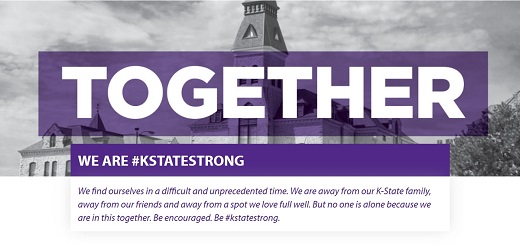04/08/20
K-State Current - April 8, 2020
K-State Current is a weekly news update for the Kansas Board of Regents to apprise the Regents on a few of the many successes and achievements made by K-State faculty, staff and students. 
K-State News
Visit K-State’s “We Are #KStateStrong” site to view brief videos designed to keep the K-State family engaged, connected and inspired during these challenging times.
Tackling COVID-19: K-Staters taking on the challenge to help locally and globally
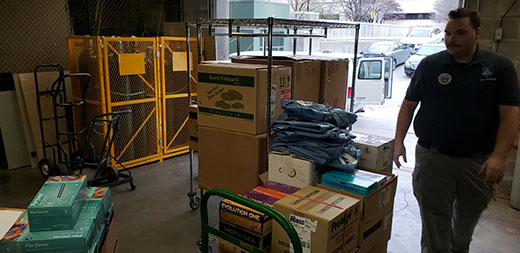 Supplies from labs across Kansas State University to help state and local efforts to fight COVID-19. Helping collect the items is 1st Lt. Don Mansker of the Kansas Civil Air Patrol.
Supplies from labs across Kansas State University to help state and local efforts to fight COVID-19. Helping collect the items is 1st Lt. Don Mansker of the Kansas Civil Air Patrol.
Kansas State University faculty and staff have been helping local and state efforts to battle COVID-19 by contributing their time and expertise as well as university resources.
"As the state's land-grant university, it is K-State's mission to serve our state, nation and world, so it's not surprising to see how K-Staters have stepped up to take on this fight," said Richard Myers, K-State president. "Whether in the lab, helping in the community or connecting people globally, K-State is making a difference."
In the battle against COVID-19:
- K-State faculty members are working at the Kansas Department of Health and Environment to help with COVID-19 testing at the department's laboratory in Topeka.
- Labs and colleges across K-State have contributed more than 60,000 items of critical personal protective equipment, or PPE, to the Kansas Division of Emergency Management and the Riley County Emergency Operations Center to distribute to health care professionals at the state and county levels. The items include 58,500 gloves and nearly 1,600 N95 masks. Other contributions include lab coats, testing equipment and safety goggles.
Serving the state
The state made the request for KDHE lab assistance to employees at Kansas Board of Regents universities who are experienced with laboratory procedures. Since these university employees are also all state of Kansas employees, they are allowed to provide qualified services to other state agencies in times of emergencies and are reimbursed. The K-Staters are assisting with logging samples, record-keeping and other routine work so that the trained KDHE staff can focus on the critical work of running COVID-19 tests.
Among the K-Staters at the KDHE lab are Rob DeLong, associate professor of anatomy and physiology in the College of Veterinary Medicine, and Mark Haub, professor and head of the food, nutrition, dietetics and health department in the College of Health and Human Sciences.
"This is a public health crisis, it's an emergency, so if you have the training and are able to work with these samples and do the work, that's what you're called to do," DeLong said. "You're called to serve. You have the training and you owe it to your country, to your colleagues, your friends, your state, your neighbors. That's how I felt."
Haub said his service means full-time employees of the lab can get a needed day or two off.
"KDHE employees have been working nonstop for several weeks, so by having fill-in workers, it allows them some time off with their families and to get a break from their high-stress work," he said.
K-State labs also have contributed PPE for health care workers locally and at the state level. The contributions are from colleges, departments and units from across campus. Included in the contributions are testing equipment — reagents and kits — that researchers from K-State's Biosecurity Research Institute in Pat Roberts Hall shared with the KDHE to expand its COVID-19 testing capacity.
"Working with the state, our local Emergency Operations Center leadership and our health providers on campus, we are coordinating contributions of supplies and talent from our research labs to prepare for and meet this crisis head on," said Peter Dorhout, vice president for research. "I'm proud of our K-State Strong community."
One Health
Tools needed to treat animals can help save human lives, which is why the College of Veterinary Medicine is doing what it can to help during the pandemic. Bonnie Rush, dean of the College of Veterinary Medicine, said U.S. Department Agriculture Secretary Sonny Perdue has asked that those in the veterinary profession and at veterinary colleges share resources with local health organizations in the effort to contain COVID-19.
"Secretary Perdue and the American Veterinary Medical Association developed recommendations for veterinarians to help in this national fight," Rush said. "We are fortunate to have a teaching hospital, veterinary diagnostic laboratory and research labs with skilled personnel who use common tools for human medicine. I am grateful for the creativity and commitment demonstrated by students, faculty and staff to contribute resources and time to this fight."
Along with College of Veterinary Medicine faculty working at the KDHE lab in Topeka, the college also has made some needed contributions to two local health care facilities.
"We have donated N95 masks to Lafene Health Center and Dr. Dave Hodgson, professor of veterinary anesthesia, prepared needed equipment to transfer a state-of-the-art ventilator to Ascension Via Christi Hospital in Manhattan," said Elizabeth Davis, interim director of the K-State Veterinary Health Center.
K-State's lab assistance, PPE and lab testing equipment contributions are being coordinated by Marty Vanier, director of the National Agriculture Biosecurity Center and associate director of the Biosecurity Research Institute.
Helping locally
Several K-Staters are providing assistance locally in the fight against the virus.
• Kyle Goerl, medical director at Lafene and a sports medicine and family physician, serves on the executive committee of the MHK COVID-19 Clinical Task Force. This physician-driven group from the Manhattan community came together to address various community needs as they relate to COVID-19 in coordination with the Riley County Health Department, Riley County Emergency Operations Center and local hospitals.
"Various needs we are working to address include the drive-through testing clinic, alternative clinic options for patients with concern for COVID-19, the community hotline, housing needs for people who may have the disease and for those with positive cases, and the collection and distribution of PPE," Goerl said.
• Mark Weiss, professor of anatomy and physiology, is taking the COVID-19 fight to the air as a lieutenant colonel in the Kansas Wing of the Civil Air Patrol, which has been called to duty by the Kansas Division of Emergency Management. Starting March 20, the Kansas Wing began transporting critical laboratory specimens from rural and remote areas to the division's laboratory in Topeka.
"The Civil Air Patrol was tasked to provide transportation of samples, kits, etc.," Weiss said. "I performed one transportation mission where I took processing kits from Manhattan to the State Department of Health lab in Topeka."
Going global
K-State's efforts also have global reach through its cyber land-grant university leadership and research.
- Two free online forums created by K-State are helping educators and even parents around the nation and world with the transition to remote learning. In its first few weeks, the Keep Teaching: Resources for Higher Ed, created by K-State Global Campus, had more than 1,500 people involved from across the U.S. and from more than 15 countries. Joining this forum is one created by the College of Education for P-12 education, the Remote Learning P-12 community.
- When it comes to treatments for COVID-19, K-State research is on the job. The university has licensed a technology that may lead to the production of an antiviral drug to treat coronaviruses and noroviruses.
Journalism and mass communication graduate program ranked among Top 10 of nation's affordable online graduate degrees
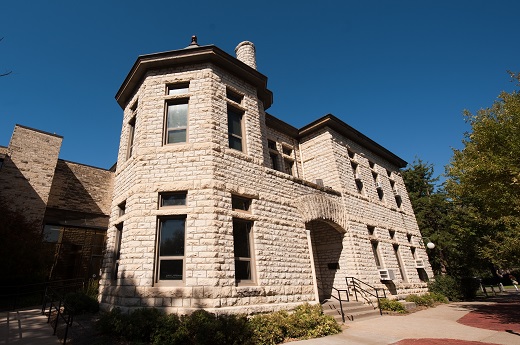 The A.Q. Miller School's recently inaugurated online master's degree has been named in the Top 10 of the nation's most affordable online programs in journalism and mass communications.
The A.Q. Miller School's recently inaugurated online master's degree has been named in the Top 10 of the nation's most affordable online programs in journalism and mass communications.
The ranking comes from Online U, which has been in the business of ranking affordability and other factors relating to potential students' choices among online degree programs since 2014. K-State is seventh on the list, with an annual tuition of $8,615. The top affordable program is Marshall University, which charges $3,948 per year.
The A.Q. Miller School of Journalism and Mass Communications launched its online master's a year ago after research among alumni and related constituencies revealed a significant demand for such a degree, primarily in Kansas City, Wichita and other metropolitan areas. The degree consists of 30 hours and is primarily focused on strategic communications classes with grounding in mass communication theory and research. The program allows students to earn credit for on-the-job research and provides electives in such areas as strategic communication management and audience analytics.
In the inaugural year, the program has attracted students from Kansas, Pennsylvania, North Carolina, Texas and Maryland.
"We envisioned this program to bring value to busy professionals who seek to upgrade their credentials or are interested in leadership positions at media organizations, nonprofits, or public relations and advertising agencies," said Raluca Cozma, associate director for graduate studies in the A.Q. Miller School. "This ranking by Online U shows that our program brings a good return on our students' investment, while allowing them the flexibility to work on a solid degree remotely, from all corners of the world."
Cozma added that a new course on social media data visualization has been added to the program, and a new graduate certificate designed to train high school media advisers is being developed in cooperation with the Journalism Education Association, the national organization for scholastic journalism that is headquartered in Kedzie Hall.
"During this time of escalating student debt, it's gratifying to know that we are offering an affordable degree that meets market demands," said Steven Smethers, director of the A.Q. Miller School.
K-State Faculty Highlights
New Coffman chair seeks to maximize value of undergraduate teaching resources at K-State
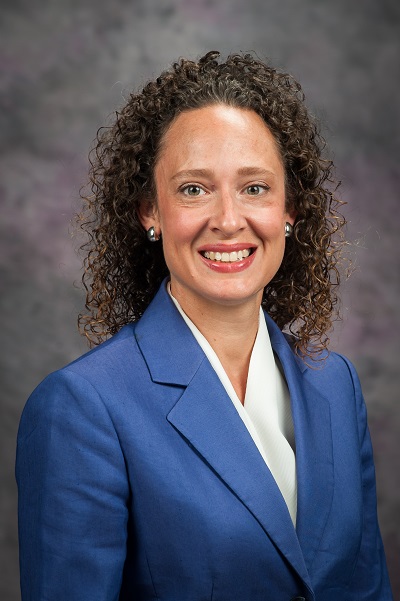 Kansas State University's newest Coffman Chair for Distinguished Teaching Scholars believes undergraduate teaching is the key to the university's success today and in the future.
Kansas State University's newest Coffman Chair for Distinguished Teaching Scholars believes undergraduate teaching is the key to the university's success today and in the future.
That's why Julia Keen plans to spend her tenure as chair evaluating the effectiveness of K-State's existing faculty undergraduate teaching programs, resources and materials and assessing ways they could be strengthened and maximized, especially during this time of tight budgets.
"Undergraduate education is critically important as it directly contributes to the success of society and the university in the long term," Keen said. "Excellence in undergraduate teaching not only attracts students initially but also creates a cycle of sustainability and continues to attract future students. Successful students become successful alumni who then contribute positively to K-State's function and reputation."
Keen, the Bob and Betty Tointon engineering chair and professor of architectural engineering and construction science, will serve as the Coffman chair for the 2020-2021 academic year. The Coffman chair was created in 1995 to highlight the university's commitment to excellence in undergraduate teaching and learning. Each chair is an acknowledged leading teaching scholar and is provided the time and resources to conduct a research project or develop programs to improve educational methods at the university.
Since joining K-State in 2003, Keen has spent her career focused on undergraduate teaching. She typically teaches nine credit hours a semester and serves as advisor to 40 students each year. She also has developed eight new courses and rewritten four others for the GE Johnson Department of Architectural Engineering and Construction Science. She has taught all of these courses as well as three others. In addition, she serves as an advisor to competition teams and student organizations in the Carl R. Ice College of Engineering and serves on university- and departmental-level committees. She also has supervised undergraduate researchers.
Keen believes her project can help the university maximize its investment potential when it comes to undergraduate teaching.
"Understanding the importance of undergraduate education and its impact on the university budget instigated the idea to assess the effectiveness of all resources focused on undergraduate teaching available to K-State faculty," Keen said. "The aim of my project is not to cut resources but instead evaluate the existing programs and identify ways to be more effective with the funding, therefore maximizing the value."
The assessment methodology of Keen's project will include surveys of current faculty to determine their needs and awareness of resources, as well as to establish a more accurate picture of the value placed on, and culture regarding, undergraduate education at K-State. She also will research successful programs at other colleges and universities.
Keen is committed to excellent undergraduate teaching. While her bachelor's and master's degrees are in architectural engineering from K-State, she decided to get her doctorate in curriculum and instruction, also from K-State, after she joined the university faculty.
"I personally felt a need for more formal training and education regarding how to become a good educator," Keen said. "I was competent in the technical content being presented in my classes, but I did not know how to best educate, assess or present this information to my students. I found this an extremely important step in my personal growth as an educator, advisor and professor."
Her dedication to undergraduate teaching has paid off with many honors, including the 2018 E.K. Campbell Teaching Award from ASHRAE. She also has received the Coonrod Family Construction Faculty Award; Multicultural Engineering Program Faculty Engagement Award; the College of Engineering's Myers-Alford Memorial Teaching Award, Charles H. Scholer Faculty Award and Hollis Award for Excellence in Undergraduate Teaching; and the American Society of Engineering Educators' Midwest Section Outstanding Teaching Award.
Keen was named to the Bob and Betty Tointon chair in 2013 and was promoted to full professor in 2015. She has served in the K-State Faculty Senate, including as president in 2013-2014. She currently serves on the President's Advisory Committee on Intercollegiate Athletics, chairing the Academic Integrity/Student-Athlete Welfare Subcommittee. She also has served on several university and department committees dealing with the university budget and student tuition and fees.
K-State Student News
Kansas State University is home to 17 national championship teams in 21 years
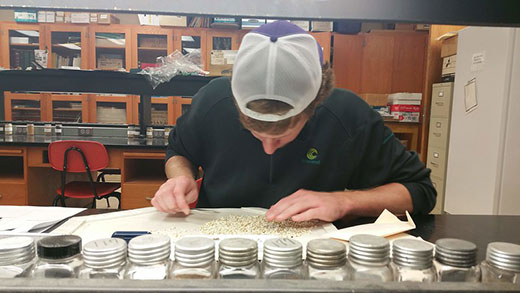 Blake Kirchhoff, junior in agronomy from Hardy, Nebraska, studies seeds ahead of a competition. Kirchhoff took individual top honors at the Chicago and Kansas City competitions last fall.
Blake Kirchhoff, junior in agronomy from Hardy, Nebraska, studies seeds ahead of a competition. Kirchhoff took individual top honors at the Chicago and Kansas City competitions last fall.
Think of dynasties and we might think of sports teams like the Bulls or the Patriots, but for more than 20 years in the agricultural world, a university team of students has reigned supreme far more than any others.
Kansas State University’s crops judging team has been national champions 17 of the past 21 years, giving those students a jump on any number of career choices in crop and food production when they graduate.
As a team, the students practice at least twice a week – more often as their fall competitions draw near, said Kevin Donnelly, K-State agronomy professor and crops team coach. Many of them spend extra time on their own studying seed and plant identification, seed analysis and the proper ways to grade grain into categories.
“They must be dedicated students who are willing to put forth the study time necessary to really learn the content thoroughly,” Donnelly said. “Successful winning scores are 95% or better. There is also a skills development component in carefully picking through the grain grading and seed analysis samples, so they need to have patience and persistence, and the willingness to practice picking through many samples to develop their skills.”
To prepare for the competitions, the students learn how to identify about 325 plants and seeds, plus do a simulation of a USDA Federal Grain Inspection System inspection in one and one-half hours.
“It’s grueling, but if you prepare well, you’re usually rewarded,” Donnelly said.
Each October, the team competes in a regional contest in Iowa, Oklahoma or Kansas, and then spends a week in November competing in national contests in Kansas City and Chicago.
The team has also made five trips to Australia in the past nine years to compete in the Australian Crops Competition, often funded in part by their high placement in U.S. contests.
Donnelly was the crops judging coach at Oklahoma State University for 13 years before coming to K-State. He has coached the K-State team since 2008.
He said the skills the students develop that are most transferable to careers are team members’ expertise in plant and seed identification.
“When they enter jobs as agronomists, whether as crop consultants, seed company reps, chemical company reps, extension agents, (or other careers), plant and seed identification is a valued skill, and they will be far above their peers and most likely their supervisors from the first day on the job.”
Leavenworth County native Kelly (Yunghans) Marshall believes she got a running start on her career because of what she learned as a team member from 2008 to 2010, in addition to her classes and working part time in a research lab in the agronomy department.
“When I came to KSU, joining the crops team was not on my radar,” said Marshall, adding that Donnelly encouraged her to give it a try. She graduated in 2011 with a bachelor’s degree in agronomy.
She fondly described walking down the streets of Chicago looking for the famous Billy Goat Tavern “to get one of Dr. D’s favorite hamburgers. We were often challenged to get out of our comfort zone, food-wise, while traveling with Dr. D and his rule of ‘no chain restaurants or fast food’ when you’re visiting a new city has stuck with me for life.”
“In addition to the skills we were tested on in competition, it also helped me understand time management and prioritization, self-accountability, how to navigate a team atmosphere and help the team succeed as a whole, not just myself,” she said. “I feel overall, the crops team gave me a competitive edge over some of my peers when entering the workforce by providing me with additional skills and an internal drive to succeed that I may not have had if I hadn’t joined.”
Marshall is now an area seed manager with Nutrien Ag Solutions, covering western Missouri and eastern Kansas.
“I would say moving forward as a senior going to grad school, time management is everything,” said Noah Wynans, a senior agonomy major from Tekonsha, Michigan who was on the most recent (2019) national championship team. He said the team spends five to six hours a week in the lab preparing for competitions.
Nate Dick, senior in agronomy from Inman, Kansas, who was also on the most recent team, said he plans to go into crop consulting when he graduates in May, so learning how to identify plants for the crops team will be helpful when he transitions into a career. He also appreciated the opportunity to travel and become acquainted with students from other schools.
Madison Tunnell, a junior in agronomy from Olathe, Kansas, said the hours spent practicing with the team represented “a learning curve” she would never forget. Her favorite part, she said, was traveling to competitions which allowed her to strengthen ties with her teammates and make connections with students from other schools, as well as industry representatives.
Team members learn seed analysis, which provides an understanding of the importance of good quality seed for planting, plus learning about grain grading provides them with an understanding of the standards that support the U.S. grain marketing system.
“Grain in the U.S. is marketed on the basis of U.S. No. 2 grade,” Donnelly explained. “Most will not become grain inspectors, but may interact with them if they work in any career involving grain marketing, including a local coop. If (students) should work in the seed industry directly, then seed analysis will be more directly applicable.”
For those students who return to their own farming operation, they will use their weed identification skills, Donnelly said, and through learning how to properly grade grain and analyze seed, will have an appreciation for the importance of clean, high quality grain for the market.
Donnelly said he enjoys his “day job” teaching as an agronomy professor, but particularly enjoys his work outside the classroom with the team: “It is a great way for me to get to know some of our best and brightest students very well. I enjoy challenging students to push themselves further than they might initially think possible”
“The travel that we do provides students with opportunities to see cultural, scenic and agricultural sites that enhance their educational experience, and I enjoy those as well,” he said. “I would like to think that it has helped attract at least some students to K-State and to major in agronomy.”
Read more about the crops team and the K-State Department of Agronomy.
Junior in physics is university's newest Goldwater scholar
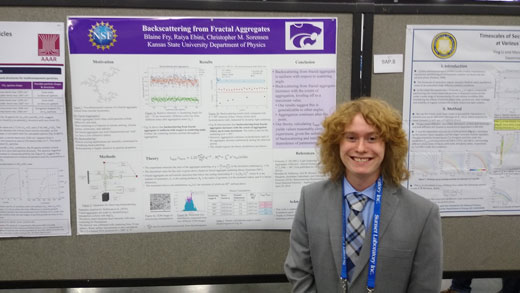
Kansas State University undergraduate researcher Blaine Fry, junior in physics, has received a 2020 Goldwater scholarship.
Kansas State University's Blaine Fry, junior in physics, Topeka, has received a 2020 Barry M. Goldwater Scholarship.
Established by Congress in 1986 to honor Sen. Barry M. Goldwater from Arizona, the Goldwater scholarship is the premier undergraduate scholarship for students interested in research careers in engineering, mathematics or the natural sciences. Awardees receive up to $7,500 annually for college-related expenses. For the 2020-2021 academic year, it was awarded to 396 students across the nation.
Fry is mentored by Chris Sorensen, Cortelyou-Rust university distinguished professor of physics, and is researching light scattering from fractal aggregates.
"Fractal aggregates are funny shapes that form when small bits of stuff collide randomly, which happens frequently in nature," Fry said. "Soot — from candles, forest fires and car engines — is a common example. Understanding how these aggregates scatter light is useful for climate science and remote sensing applications, besides being a fascinating step forward in describing scattering from arbitrary particles."
Fry's work is specifically researching backscattering: the light that scatters back toward the source. It can be very dim, making it hard to measure.
"Through his research and our personal interactions, I can attest to the fact that Blaine is very bright," Sorensen said. "He learns quickly and interacts with intelligence. He is a self-starter and self-reliant. He is inventive. He has terrific experimental intuition. His background as a kid is full of science; he has science in his bones!"
Fry is the vice president of Physics Club, a member of Astronomy Club, a participant in the University Honors Program and an avid pianist. In addition to the Goldwater scholarship, Fry is an Ellis Foundation Scholar and has received the Putnam Scholarship, A.B. Cardwell Fund Scholarship, Richard Horning Physics Scholarship, J.O. Hamilton Physics Memorial Scholarship, National Merit Scholarship, and the Al and Darline Peterson Scholarship from the Topeka Community Foundation. In addition, he was a finalist for the K-State Civic Leadership Scholarship, winner of the American Association for Aerosol Research Student Poster Competition and an Eagle Scout for Troop 59 in the Jayhawk Area Council.
A graduate of Topeka West High School, Fry is the son of Clint Fry and Cassandra Immenschuh, both of Topeka.
